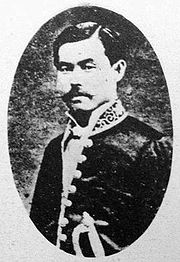
Rikken Teiseito
Encyclopedia

Political party
A political party is a political organization that typically seeks to influence government policy, usually by nominating their own candidates and trying to seat them in political office. Parties participate in electoral campaigns, educational outreach or protest actions...
in the Meiji period
Meiji period
The , also known as the Meiji era, is a Japanese era which extended from September 1868 through July 1912. This period represents the first half of the Empire of Japan.- Meiji Restoration and the emperor :...
Empire of Japan
Empire of Japan
The Empire of Japan is the name of the state of Japan that existed from the Meiji Restoration on 3 January 1868 to the enactment of the post-World War II Constitution of...
. It was also known as simply the ‘Teiseitō’.
The Teiseitō was founded in March 1882, by the editor of the Tokyo Nichi Nichi Shimbun
Tokyo Nichi Nichi Shimbun
The Tokyo Nichi Nichi Shimbun was a newspaper printed in Tokyo, Japan from 1872 to 1943.In 1875, the company began the world's first newspaper delivery service....
, Fukuichi Gen'ichirō
Fukuchi Genichiro
was a Japanese critic and author, also known under the pseudonym .-Biography:Fukuchi was born in Nagasaki, Japan. He traveled Europe as a translator, and in 1874, became a main writer for the Tokyo Nichi Nichi Shimbun newspaper. In 1882, he formed the Constitutional Imperial Rule Party....
, and a number of bureaucrats and conservative journalists as a political support group for the conservative Meiji oligarchy
Meiji oligarchy
The Meiji oligarchy was the name used to describe the new ruling class of Meiji period Japan. In Japanese, the Meiji oligarchy is called the ....
. The new party was supported by Itō Hirobumi
Ito Hirobumi
Prince was a samurai of Chōshū domain, Japanese statesman, four time Prime Minister of Japan , genrō and Resident-General of Korea. Itō was assassinated by An Jung-geun, a Korean nationalist who was against the annexation of Korea by the Japanese Empire...
and Inoue Kaoru
Inoue Kaoru
Count , GCMG was a member of the Meiji oligarchy during the Meiji period Empire of Japan. As one of the senior statesman in Japan during that period, he had a tremendous influence on the selection of the nation's leaders and formation of its policies.-Early years:...
It advocated a constitutional monarchy
Constitutional monarchy
Constitutional monarchy is a form of government in which a monarch acts as head of state within the parameters of a constitution, whether it be a written, uncodified or blended constitution...
with a constitution
Constitution
A constitution is a set of fundamental principles or established precedents according to which a state or other organization is governed. These rules together make up, i.e. constitute, what the entity is...
, to be eventually granted by Emperor Meiji
Emperor Meiji
The or was the 122nd emperor of Japan according to the traditional order of succession, reigning from 3 February 1867 until his death...
, an electoral franchise based on adult male property holders and restrictions on freedom of speech and assembly. It viewed the populist political parties, especially the Rikken Kaishintō
Rikken Kaishinto
The was a political party in Empire of Japan. It was also known as simply the ‘Kaishintō’.The Kaishintō was founded by Ōkuma Shigenobu on 16 April 1882, with the assistance of Yano Ryūsuke, Inukai Tsuyoshi and Ozaki Yukio. It received financial backing by the Mitsubishi zaibatsu, and had strong...
and the Jiyūtō
Liberal Party of Japan (1881)
The is the name of several liberal political parties in the history of Japan, two of which existed in the Empire of Japan prior to 1945.-Liberal Party of 1881:...
as its main rivals. It was disbanded in September 1883.

